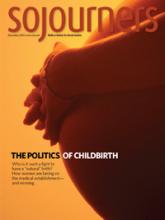In February 2009, I attended a conference in Egypt taught by Arab Christians from throughout the Middle East.
During a break in the conference, I met in a small conference room with a dozen Egyptian Christian leaders. I said to them, "I find myself dreaming and praying about peace in the Middle East. Am I naïve to entertain that possibility? From your perspective, what are the biggest issues standing in the way of peace?"
They said that by far the most serious hindrance to peace in the Middle East is U.S. policy toward Israel-Palestine. "Americans don’t know what they're doing to us," they said. They explained that when Americans ignore the plight of Palestinians, this inflames the entire Arab world against the "Christian West," and against Arab Christians as well.
The second problem, they said, is Muslims in the Middle East. "The number of extremist, violent Muslims is growing," they said. "That trend must turn around."
They said the third major hindrance to peace is Christians in the Middle East: Too many of them hate Muslims. "We're working on loving them," they said, "but we have a long way to go." I appreciated their honesty. Throughout the world, it seems, both Christians and Muslims "have a long way to go" in learning to love one another.
That evening, the final meeting of the conference was a celebration of what God had done in the previous year. Men and women paraded into the room dressed in the traditional clothing and carrying the national flags of their countries, then told story after story of spiritual transformation in unexpected places. In every way, it was a celebratory atmosphere.
But the longer we sat there, the sicker I felt. I sensed God’s calling that night with such force and weight that I -- literally -- felt like I got kicked in the stomach. It was a spiritual encounter, but it was so strong I felt it physically.
Read the Full Article
